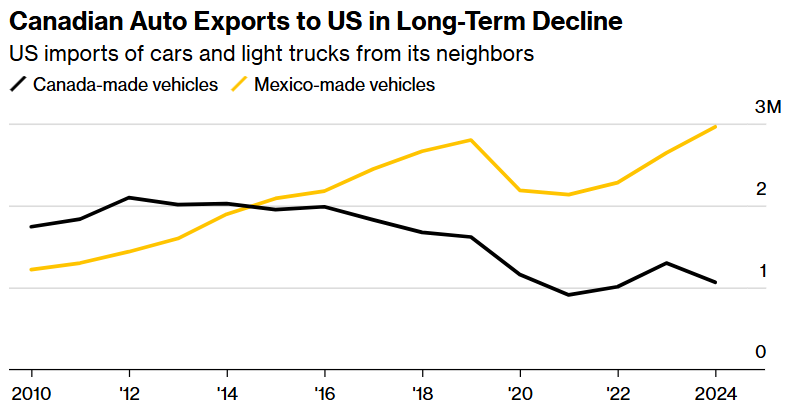Navigating the US-Canada Trade War: How Small Businesses Can Stay Resilient
With the escalating trade tensions which is sending shockwaves through businesses on both sides of the border. Large corporations may have the resources to absorb costs and adjust strategies, But what about small businesses can they weather the economic storm?
BUSINESS & ECONOMICS
Nkem Idonor
3/11/20253 min read


The escalating trade tensions between the United States and Canada are sending shockwaves through businesses on both sides of the border. While large corporations may have the resources to absorb costs and adjust strategies, small businesses are particularly vulnerable to the consequences of trade disputes.
For small business owners, rising tariffs, supply chain disruptions, and unpredictable regulations create an environment of uncertainty that can impact profitability and long-term sustainability. The question now is: How can small businesses navigate these turbulent times?
Understanding the Impact of the Trade War
Trade conflicts between economic powerhouses like the U.S. and Canada can cause ripple effects across various industries. Increased tariffs mean higher import/export costs, leading to price hikes on essential goods. Small businesses that rely on international suppliers may struggle to maintain competitive pricing, while those engaged in cross-border trade could experience delays, added compliance costs, and disrupted supply chains.
Instead of waiting for a resolution, small businesses must take a proactive approach to safeguard their operations and remain competitive.
Three Key Strategies for Small Businesses to Mitigate Trade War Risks
1. Diversify Supply Chains
One of the biggest risks during a trade war is relying too heavily on a single country for supplies. Businesses sourcing raw materials or finished goods exclusively from the U.S. or Canada could face higher costs, shipping delays, or even supply shortages.
A smart approach is to expand supply chain networks and explore alternatives in resource-rich regions such as #Nigeria, #SouthAfrica, #Egypt, and #Zimbabwe. By tapping into these markets, businesses can reduce dependency on trade-restricted countries and enhance their resilience against future disruptions.
Diversification also applies to logistics and distribution channels, having multiple suppliers and alternative shipping routes can minimize the risk of bottlenecks affecting production or inventory. Take a look at Trump’s move to increase tariffs on Canada, which would also cost American businesses. Canada is the main source of aluminum for US industry and the auto plants Trump is threatening to shut down are owned by US automakers.
Source: US Department of Commerce
2. Explore Domestic Markets
For businesses that depend heavily on exports, focusing on local markets can be a game-changer. While global trade offers expansion opportunities, a strong domestic presence can provide stability during volatile trade periods.
Shifting towards "100% local" sourcing, production, and sales minimizes exposure to tariffs while fostering economic growth within communities. A business that once relied on international clients might find new opportunities in regional partnerships, government contracts, or emerging industries within their home country.
Moreover, consumer preferences are shifting toward locally made products, and businesses that capitalize on this trend can build stronger brand loyalty while avoiding the unpredictability of global trade disputes.
3. Utilize Hedging Strategies to Manage Financial Risks
Currency fluctuations, tariffs, and economic instability often go hand in hand with trade wars. Small businesses can protect themselves by leveraging hedging strategies such as:
i) Forward Contracts – Locking in prices for future purchases to protect against price volatility.
ii) Options Contracts – Giving businesses the ability to buy or sell currencies at predetermined rates, minimizing forex risks.
iii) Diversified Revenue Streams – Expanding into subscription-based models, digital services, or multiple markets to offset revenue losses from affected sectors.
These financial tools allow businesses to maintain stability and predictability in their expenses, even when external factors create market volatility.
Looking Ahead: The Role of Proactive Strategy
While we all hope for a peaceful resolution to the US-Canada trade dispute, waiting for a breakthrough is not a strategy. Small businesses must stay agile, informed, and ready to adapt to changing market conditions.
At Gronium Inc., we specialize in helping businesses navigate uncertainties through:
📌 Business Intelligence Solutions – Data-driven insights to optimize supply chains and identify emerging opportunities.
📌 Trade Risk Assessments – Evaluating potential risks and recommending mitigation strategies.
📌 Market Expansion Consulting – Helping businesses diversify into new regions for long-term sustainability.
With the right strategies, small businesses can turn challenges into opportunities and emerge stronger.
How do you think small businesses should navigate these challenges? Share your thoughts in the comments!
#TradeWar #USCanada #SmallBusiness #RiskManagement #SupplyChain #BusinessGrowth #GroniumInc #GlobalTrade




Stay in touch
© All rights reserved 2024, Gornium Inc.
